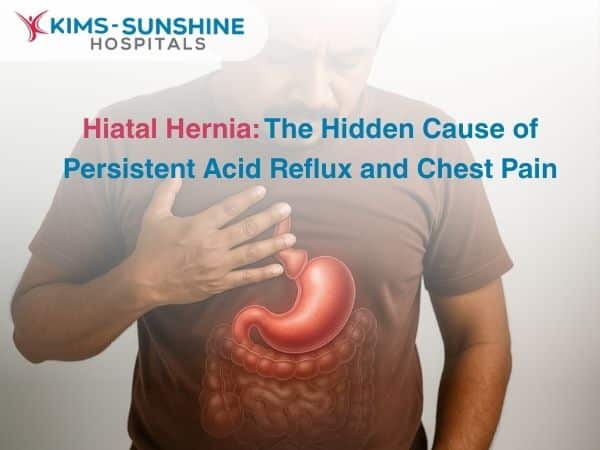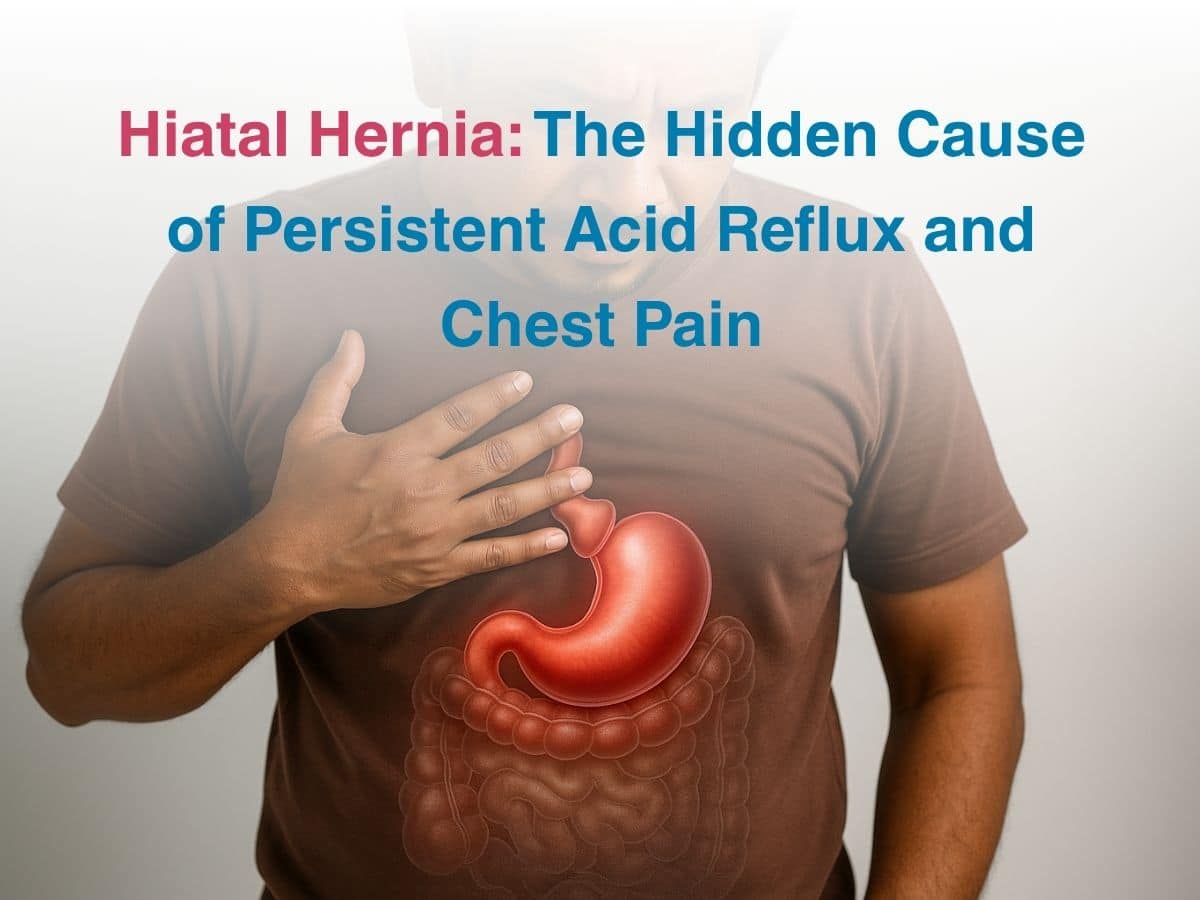
Hiatal Hernia: The Hidden Cause of Persistent Acid Reflux and Chest Pain
 A hernia is a condition where parts of any organ protrude out of the muscle or protective layer they are encased in. Hernias are pretty common but never problematic in many cases, all over the world. Hernias are of many types and a hiatal hernia is a specific kind of hernia which can cause unwanted side effects like acidity, heart burn etc. Studies have shown that men are more likely to have one, when compared to women, though this may not be true due to underdiagnosis of many cases in women.
A hernia is a condition where parts of any organ protrude out of the muscle or protective layer they are encased in. Hernias are pretty common but never problematic in many cases, all over the world. Hernias are of many types and a hiatal hernia is a specific kind of hernia which can cause unwanted side effects like acidity, heart burn etc. Studies have shown that men are more likely to have one, when compared to women, though this may not be true due to underdiagnosis of many cases in women.
What Is A Hiatal Hernia?
You have a hiatal hernia if a part of the top of your stomach pushes above the opening of the diaphragm. The diaphragm is the muscle which helps you breathe and it also acts as a physical barrier between your chest cavity and abdominal cavity. The diaphragm has an opening to allow your food pipe to pass through and to the stomach- and that is a natural structural weakness. There are 4 types of hiatal hernias and this classification is done to understand how much of the stomach pushes up, above the diaphragm. Type 1 is super common while type 4 is extremely rare.
Causes Of Hiatal Hernia-
The part where the oesophagus meets the stomach is present in an opening of the diaphragm- which means if this oesophageal hiatus gets even a little larger, then a hiatal hernia can easily form. Some people may have it as a birth defect but for most people, it is due to hard physical labour, chronic constipation and straining while pooping, pregnancy, childbirth, heavylifting, frequent emesis or obesity, respectively.
Symptoms Of Hiatal Hernia (Acid Reflux, Chest Pain)-
You will have symptoms which are closely related to heartburn or GERD- indigestion can also occur often. You may burp excessively or not be able to swallow food and keep it down. You may also have a perpetually sore throat, due to damage by gastric acids. Some people may complain of pressure in their lower chest or cannot breathe normally if the hernia is pressing up against their lungs. Some people say that the pain can feel like that of a heart attack, which means it can be pretty intense and unpleasant to deal with.
Diagnosis Of Hiatal Hernia (Endoscopy, Imaging)-
Simple imaging- like a chest X-ray, oesophagram or upper endoscopy may be used. Oesophageal manometry is a specialised test to check for the amount of pressure exerted by muscles in a particular area of the oesophagus.
Complications Of Untreated Hiatal Hernia-
Hiatal hernias cannot just go away on their own and most often get worse over time. But, they may still be asymptomatic for the most part. Untreated hiatal hernias can cause oesophageal strictures where the muscles of the food pipe cannot contract or relax normally, causing a stuck-in-the-throat sensation all the time. It can also cause tissue to scar. Barrett’s oesophagus is a condition which may occur-where the cells of your oesophagus begin to look and function like those of the small intestine (pre-cancerous stage). Obstruction and gastritis can also occur if the hernia gets stuck. For some people, the opening of the diaphragm may close down tightly on the hernia, causing that region of the stomach to get inflamed and die due to poor or no blood flow.
Treatment Options For Hiatal Hernia-
Most people respond really well to acid reflux medications but surgery may be done if your hernia gets larger, or if medications to deal with the hernia cause unwanted side effects. The procedure involves pulling down the stomach and lower parts of the oesophagus below the diaphragm. They may also close the hole at the diaphragm or do a fundoplication- where the upper most fundus of the stomach is stapled to the lowest parts of the oesophagus- causing the muscles to tighten in that region and making it harder for any part to move above the diaphragm.
Conclusion
Hiatal hernias are mostly benign structures which don’t cause any problems for most people. But, when you have chronic acidity, reflux and associated symptoms, your quality of life can suffer. This is when surgery may be recommended. After getting surgery done, focus on eating soft foods and on recovery for the next few weeks. Hiatal hernia surgery is a very successful procedure normally (over 90% of cases respond well) and you won’t have to deal with acid reflux or pain afterwards. So, talk to your doctor and get a referral to an experienced gastroenterologist, for better care.






